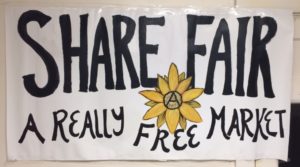This article was shared with us anonymously and we were asked to share it.
The city of Eugene has developed a pattern of targeting people in our community who are offering care and resources to the most poor and vulnerable among us. On Thursday, December 5th the police showed up and threatened to arrest every one of the people in a group called Neighbors Feeding Neighbors that routinely serves meals at the Washington Jefferson park. This group, (formerly Breakfast Brigade, and more formerly the Catholic Workers) spend time out of their days to feed unhoused neighbors, acting with diligent and consistent compassion, serving free meals to people at Wash-Jeff park four days a week for years. Last year, 2023, after nine years of serving food in the park, EPD showed up and threatened the helpers with arrest. In response, the group obtained a permit to continue feeding in the park. In the last few months of 2024, three things have happened:
– The Whitteaker Community Council sent a letter to the city of Eugene requesting that the group’s permit be removed, and that ALL FUTURE groups be denied permits to serve meals in the park
– The group lost access to the commercial kitchen space that they had been using to prepare food
– The city of Eugene revoked the permit from the group, citing that they had failed to comply with certain parking requirements while unloading
Whittaker Community Council complains of their “compassion fatigue” as they sit inside their warm houses watching people struggle to survive across the street in Eugene’s own Washington-Jefferson park. Perhaps this is too harsh a judgment on the NIMBY* association; more likely they have nothing more than the parting glance for those suffering hungry in the cold just a few dozen feet from their front door, and resent the shattering of their piece when one of these wretched of the earth dares to shatter their lofty illusion of privilege by making a bit more noise than they would like. Whittaker Community Council’s fatigue must be deep indeed to prompt them to repeatedly call the Eugene Police on Neighbors Feeding Neighbors in order to shut down their truly reprehensible actions of giving breakfast to the people who have found WJ to be a suitable place to stay for a while (every Wednesday-Saturday at 9am).
This cannot continue. People suffer enough on the streets and it is clear that many in this town are embarking on a war of attrition with the most vulnerable in our community. They simply hope to see them dead and gone so they can stop being such a bother to people who have nothing but cruelty and contempt in their hearts such as the good, compassion fatigued people of the Whittaker Community Council. A number of concerned citizens stood up to these unjust threats and intimidations, showing up in force to assist with the food distribution and to defend the good people of Neighbors Feeding Neighbors from being ticketed or arrested. The police responded to this by illegally sweeping a nearby camp without notice to the people in the camp, sending a clear message that they are cowards who would rather push around people without resources than try and make good on the lies and threats they bring to a group of elderly Christians.
This is a call to action for concerned people of Eugene, whatever your personal motive may be; do not sit on your laurels this winter and look the other way while the harassment of the unhoused and those who try to help them continues. Join Neighbors Feeding Neighbors (every Wednesday-Saturday at 9am at Wash-Jeff park), join Food Not Bombs (every Friday at 4:30pm at the Park Blocks), or start your own food distribution with your friends. distribute food, defend those doing so against bullying and intimidation. Let us show that for every food distributor that they harass and intimidate, ten more will take their place. “Guerilla Food Distro” your neighbors, the people on the streets, your friends. I know of several such groups that have no name to list that have already popped up in Wash-Jeff park, meeting under bridges and the cover of night to hand off the most delicious soups and juiciest burgers for the low low cost of complete free-dom. Let the hatred of these NIMBY so-called neighbors boil the pasta inside your heart to fill the bellies of the friends you make along the way. “Hate serve” with a radical love in your heart that they will never understand or name because they cannot feel it, and the most delicious of food in your hands to share with people struggling to survive this Winter.
-A Bug
 The Solidarity Share Fair is returning in January with a large in-person indoor event!
The Solidarity Share Fair is returning in January with a large in-person indoor event!